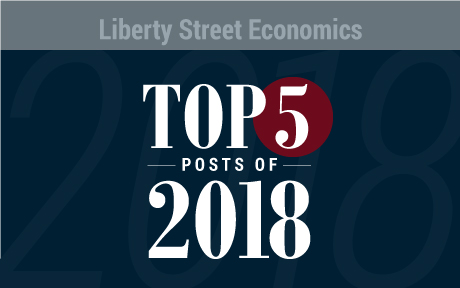“Cryptocurrency” hit the cultural mainstream in 2018. In March, Merriam-Webster added “cryptocurrency” to the dictionary, and in what was perhaps a greater litmus test of pop culture recognition, “bitcoin” was added to the official Scrabble dictionary in September. With such a surge in interest, it’s not too surprising that the most viewed post on Liberty Street Economics this past year focused on an issue surrounding how digital currencies operate that is not often put in the spotlight—trust. Similarly, as the subject of tariffs has become a more frequent topic of discussion in the news, readers have sought additional info, which fueled interest in another of our most viewed posts of the year. As 2019 approaches, we offer a chance to revisit these posts and the rest of our top five of 2018.
Bitcoin and other cryptocurrencies have been in the headlines throughout 2018, particularly because of their wild gyrations in value. In this Q&A, Michael Lee and Antoine Martin, economists in the New York Fed’s Money and Payment Studies function, offer some insight about how cryptocurrencies are particularly useful in situations where trust is absent. (February 9)
Import tariffs are on the rise in the United States. One of the objectives of these new tariffs is to reduce the U.S. trade deficit. Although more costly imports are likely to reduce the quantity of imports into the United States, our bloggers argue that U.S. exports will also fall. That is not only because of other countries’ retaliatory tariffs on U.S. exports, but also because the costs for U.S. firms producing goods for export will rise. The end result is likely to be lower imports and lower exports, with little or no improvement in the trade deficit. (August 13)
By Mary Amiti, Mi Dai, Robert C. Feenstra, and John Romalis
As authorized under the Dodd-Frank Act of 2010, the FDIC developed a “single point of entry” (SPOE) strategy with the goal of ending “too big to fail.” Under SPOE, healthy parent companies bear the losses of their failing subsidiaries. Our bloggers contend that this strategy would have made the parents riskier, relative to their subsidiaries. They find a difference of opinion when examining whether bond raters and investors share their view. (March 5)
By Gara Afonso, Michael Blank, and João A.C. Santos
The New York City subway system is plagued by delays and frequently fails to deliver riders to their destinations on time. Although these delays are a headache for anyone who depends on the subway, they do not affect all riders in the same way. Our bloggers explain why subway delays disproportionately affect low-income New Yorkers. (June 27)
By Nicole Gorton and Maxim Pinkovskiy
Our bloggers open a series of three posts that explore the forces behind the persistence of historically low interest rates in recent years. They propose an alternative hypothesis that centers on the premium associated with safe and liquid assets, arguing that the increase in this premium since the late 1990s has been a key driver of the decline in the real return on U.S. Treasury securities. (February 5)
By Marco Del Negro, Domenico Giannone, Marc Giannoni, and Andrea Tambalotti
Still interested? The series continues with these posts
A Time-Series Perspective on Safety, Liquidity, and Low Interest Rates
A DSGE Perspective on Safety, Liquidity, and Low Interest Rates
Disclaimer
The views expressed in this post are those of the author and do not necessarily reflect the position of the Federal Reserve Bank of New York or the Federal Reserve System. Any errors or omissions are the responsibility of the author.
 Trevor Delaney is a publications editor in the Federal Reserve Bank of New York’s Research and Statistics Group
Trevor Delaney is a publications editor in the Federal Reserve Bank of New York’s Research and Statistics Group
How to cite this blog post:
Trevor Delaney, “Cryptocurrencies, Tariffs, “Too Big to Fail,” and Other Top LSE Posts of 2018,” Federal Reserve Bank of New York Liberty Street Economics (blog), December 7, 2018, https://libertystreeteconomics.newyorkfed.org/2018/12/cryptocurrencies-tarrifs-too-big-to-fail-and-other-top-lse-posts-of-2018.html.

















 RSS Feed
RSS Feed Follow Liberty Street Economics
Follow Liberty Street Economics